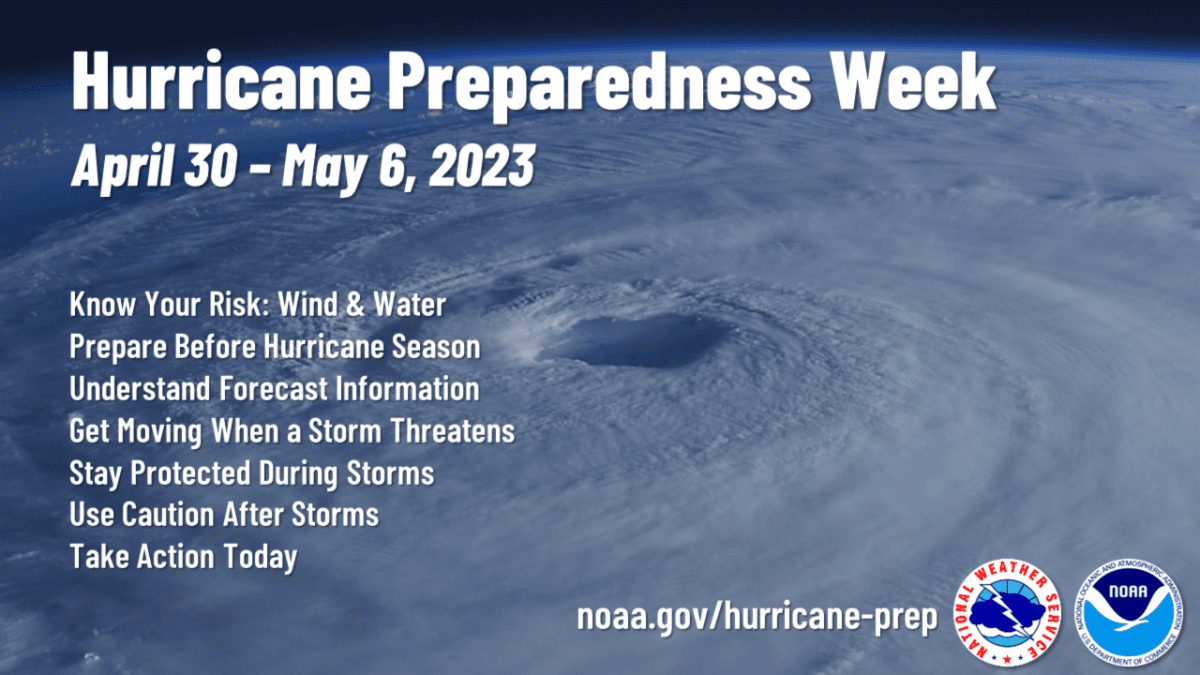Hurricanes are not just a coastal problem. Their impacts can be felt hundreds of miles inland and significant impacts can occur without it being a major hurricane. Hurricane Preparedness Week is your time to prepare for a potential land-falling tropical storm or hurricane.
Sunday, April 30 – Determine Your Risk
Find out what types of winds and water hazards can happen where you live, and then start preparing for how to handle them. Hurricanes bring many hazards to U.S. coastlines and inland areas, including storm surge along the coast, inland flooding due to heavy rainfall, tornadoes, strong wind, rip current & large waves.
Monday, May 1 – Develop An Evacuation Plan
The first thing you need to do is find out if you live in a hurricane evacuation zone. If you do, now is the time to begin planning where you would go and how you would get there. You do not need to travel hundreds of miles, but have multiple options. Your destination could be a friend or relative who doesn’t live in an evacuation zone. If you live in a well-built home outside the evacuation zone, your safest place may be to remain home. Be sure to account for your pets in your plan.
Tuesday, May 2 – Assemble Disaster Supplies
You’re going to need supplies not just to get through the storm but for the potentially lengthy and unpleasant aftermath. Have enough non-perishable food, water and medicine to last each person in your family a minimum of three days. Electricity and water could be out for at least that long. You’ll need extra cash, a battery-powered radio and flashlights. You may need a portable crank or solar-powered USB charger for your cell phones.
Wednesday, May 3 – Get An Insurance Checkup
Call your insurance company or agent and ask for an insurance check-up to make sure you have enough homeowners insurance to repair or even replace your home. Don’t forget coverage for your car or boat. Remember, standard homeowners insurance doesn’t cover flooding. Whether you’re a homeowner or renter, you’ll need a separate policy for it, and it’s available through your company, agent or the National Flood Insurance Program.
Thursday, May 4 – Strengthen Your Home
If you plan to ride out the storm in your home, make sure it is in good repair and up to local hurricane building code specifications. Many retrofits are not as costly or time consuming as you may think. Have the proper plywood, steel or aluminum panels to board up the windows and doors. Remember, the garage door is the most vulnerable part of the home, so it must be able to withstand the winds.
Friday, May 5 – Help Your Neighbor
Many Americans rely on their neighbors after a disaster, but there are also many ways you can help your neighbors before a hurricane approaches. Learn about all the different actions your community can take to prepare and recover from the hazards associated with hurricanes: ready.gov/neighbors
Saturday, May 6 – Complete A Written Plan
The time to prepare for a hurricane is NOW, before the season begins. Once you’re under pressure, having a written plan will take the guesswork out of what you need to do to protect you and your family. Know where you will ride out the storm and get your supplies now. You don’t want to be standing in long lines when a Hurricane Watch is issued. Those supplies that you need will probably be sold out by the time you reach the front of the line. Being prepared now will mean the difference between your being a hurricane victim and a hurricane survivor.
Remember, it only takes one storm to change your life and community. For more information on hurricanes & hurricane safety, click here.
GHMS will keep you informed and up to date on the front page of our website. Please refer to the front page of our site before, during and after the storm for any and all important information regarding the storm and the precautions that we are taking.


